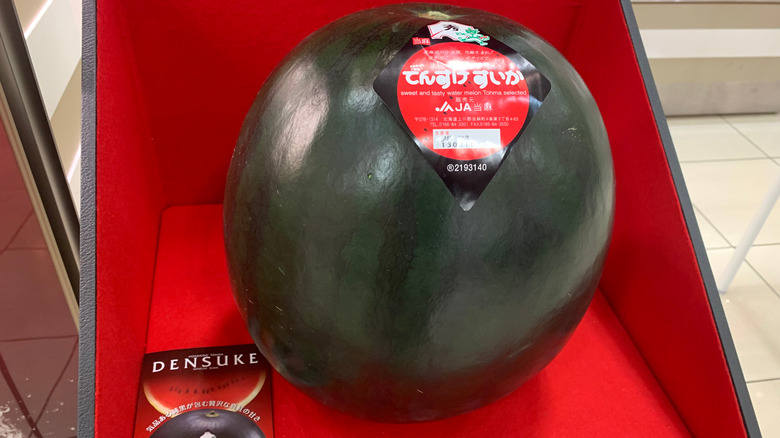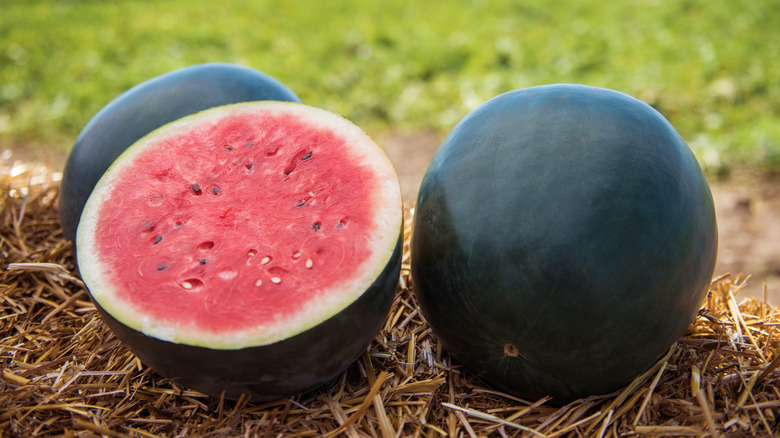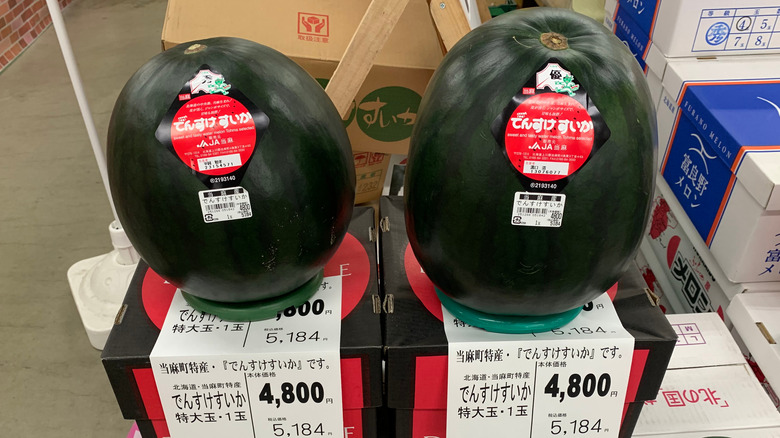The Reason Densuke Watermelons Are So Expensive
One of the world's most expensive foods is the color of night and is grown in only one place on Earth. While gourmands may be accustomed to costly dark delicacies such as black truffles, squid ink pasta, and black beluga caviar, few have had the privilege of tasting a black Densuke watermelon. Setting a record in 2008, a 17-pound specimen of the rare fruit sold at auction for an astonishing 650,000 yen, worth $6,100 USD at the time. The Densuke watermelon is desired as much for its appearance as it is for its taste, having a glossy, black rind, and bright red, nearly seedless flesh that is extremely sweet.
One reason the melons are so expensive? Scarcity. Densuke watermelons are grown exclusively on the island of Hokkaido in northern Japan. Production is centralized in the town of Tohma – where the island's specific climate and mineral-rich volcanic soil make cultivating the fruit possible. A variety of Black Diamond watermelon, the Densuke was introduced in 1981 when Hokkaido farmers began switching to crops outside of traditional rice paddies. The Densuke name was trademarked in 1989, and only watermelons grown in the region that pass a rigorous inspection process can be certified as genuine. They are labor-intensive and require a large amount of acreage, water, and attention to thrive, and for those reasons, only a limited supply is available each growing season. The cream of the crop from each harvest is sold at auction where the limited availability drives up the price.
Japan's black fruit is the sweetest gift money can buy
The Densuke's black watermelon rind encloses red, juicy flesh, described as firm and crunchy, with the delicious taste markedly sweeter due to its higher sugar content. Fruit is held in high regard in Japanese society, and the Densuke is considered the king of watermelons, so they are treated accordingly like royalty — from planting to picking to packing. Resembling engorged bowling balls, the melons are repeatedly turned by hand while still on the vine, to avoid uneven growth, discoloration, bruising, or soft spots. Once harvested, each melon is polished to a glistening black sheen, then assessed for quality and appearance before receiving an inspection sticker as a certificate of origin and authenticity, and then each is packaged in distinctive gift boxes.
Agriculture and farmers are highly valued in Japanese culture. While vegetables and grain are readily accessible, Japanese-grown fruit is not as plentiful, and therefore prized as a luxury. Fruit is given as an offering in Japan where Shintoism and Buddhism are the dominant religions. This spiritual reverence combines with a patriotic sense of pride in the nation's produce to make fruit a symbol of respect. It is given as a sign of admiration during Japan's two seasonal gift-giving holidays, and for occasions like weddings, or to impress one's employer. It follows that the more uncommon, flawless, scarce — and expensive — a fruit is, the greater worth it has when given as a high-end token of esteem.
Where to find Hokkaido's dusky luxury fruit
Only the largest, blemish-free, and most perfect fruits make it to auction, with the season's first picks and most exemplary qualities commanding the highest bids. 2020 saw a significant drop in auction prices, which declined along with the rest of the global market due to COVID-19, by which Hokkaido's agricultural industry was particularly hard-hit. The highest bid at the 2020 Densuke auction was for only 220,000 yen, worth $2,050 USD at the time, considerably less than the record-setting high of $6,100 12 years prior. By 2021, prices had begun to rebound with an auction in Hokkaido's capital Sapporo closing at 600,000 yen, approximately $4,275 today.
The melons that don't make it to auction are slightly more accessible, available from luxury fruit parlors, which are popular, high-end shopping destinations in Japan, much like jewelry stores are in the West, and where you can find other upscale specialties like the expensive crown melon cantaloupe. Ripe Densuke watermelons can also be purchased from June through August directly from growers in Tohma village where they can be found in local markets and roadside stations for about $190 to $300 dollars. For anyone not in Hokkaido and unable to get the fruit fresh, seeds can be purchased online, and growing your own is another option – although conditions may not be optimal, and only fruits grown in the region are acknowledged as legitimate Densuke.



